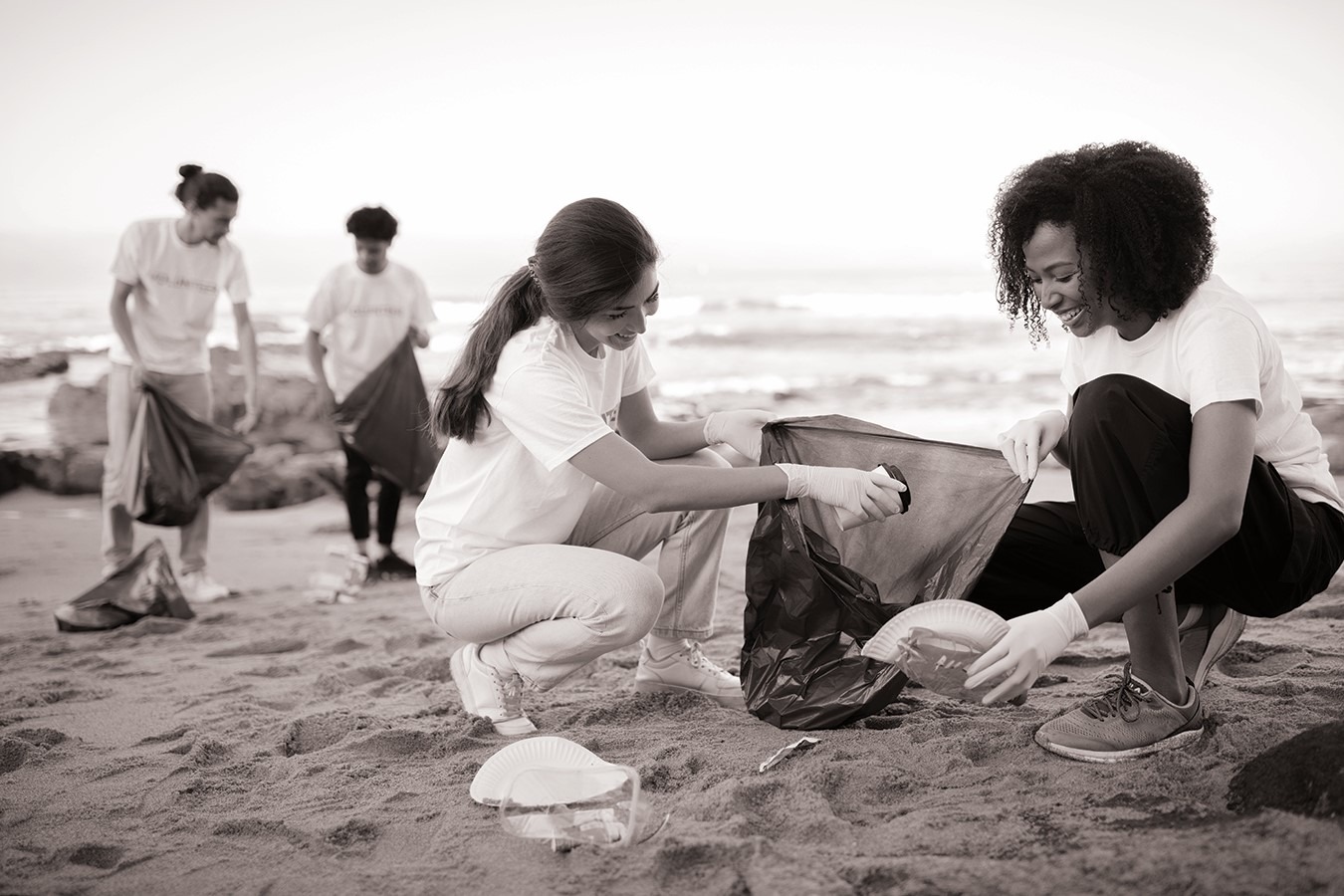The role corporate social responsibility plays in real-world impact
The meetings industry is grounded in impact—and not just for attendees. An increased focus on corporate social responsibility (CSR) has led to real-world, positive change for many local economies, environments and communities. Thanks to a growing awareness of the potential drawbacks of meetings and events, such as food waste, energy use, environmental damage and more, both meeting profs and vendors have spurred an evolution in how all sides approach planning and executing gatherings.
We saw this in action during Smart Meetings’ Culinary Experience, held at Paris Las Vegas this past August, where the audience learned how F&B offerings can provide an excellent opportunity for sustainable planning. One venue going above and beyond in this is Caesar’s Entertainment, where Michele Polci, Caesars Entertainment director of catering sales-Las Vegas, has spearheaded an initiative to revolutionize the company’s approach to F&B. Elements include keeping employee dining halls stocked with surplus meals, partnering with charities to distribute excess, composting food waste and maintaining staff dedicated to properly sorting recyclables.
The True Value of CSR to Companies
Opportunities to integrate CSR into the operations of all parties involved in the meetings and events industry are numerous; from including eco-friendly activities during your incentive trips to forming an ongoing partnership with a nonprofit or charity, the depth of your impact is up to you.
Read More: CSR Fights Hunger
Based on the data, companies are increasingly approaching CSR as much more than a check box on a list of good deeds. Research by Harvard Business School reveals 70 percent of Americans believe it’s either “somewhat” or “very important” for companies to make the world a better place. This is compared to just 37 percent who believe it’s most important for a company to make money for shareholders.
Enacting CSR programs can be an essential element in creating sustainable company culture; the same report discovered that nearly 70 percent of employees say they wouldn’t work for a company without a strong purpose. When it comes to a company’s bottom line, caring about CSR isn’t just a moral question—it’s a definitive fiscal benefit. The study also found that 58 percent of organizations that currently have a strong and clear sense of purpose experienced 10 percent or more growth during the last three years.
The New Wave of CSR Implementation

CSR is one of the most direct ways to “walk the walk” of positive societal impact. As such, many meeting profs are finding CSR approaches to be more and more essential to their events. Both meeting profs and venues are also experiencing a demand for newer and more innovative CSR approaches. Berlin-based Kempinski Hotels has recently debuted its Responsible Meetings and Events by Kempinski services, described as “a visionary concept designed to help planners measure and reduce their environmental impacts.” Kempinski has had a longstanding partnership with EarthCheck, a leading authority on sustainable travel and tourism, whose VenueCheck system does yearly assessments and grants approved venues this esteemed distinction.
Research published by the Journal of Management Studies recently uncovered a critical element of successful CSR programs: experimentation. Researchers explained the term as it applied in the study by saying, “In a CSR context, experimentation means that companies produced knowledge about the local effects of their CSR practices and used this knowledge to adapt their CSR practices on an ongoing basis.”
This is where meeting profs can offer invaluable services to clients in search of events with CSR integration by working with local DMCs to craft high-impact programs that provide notable returns. Annual events held in the same location can offer particularly powerful opportunities in the shape of cultivated, ongoing relationships with local nonprofits and charities that can demonstrate the positive change a longstanding partnership can create.
Balancing Travel with Sustainability

Tourism Cares is a global nonprofit organization dedicated to uniting industry professionals in the common goal of sustainability. Last year, the group employed three new training models for participants: working with indigenous communities, marketing a sustainability journey and nature-positive tourism.
Tourism Cares partnered with the American Indian Alaska Native Tourism Association to tackle the first model and educate professionals about why and how it is important to integrate Indigenous experiences into group travel experiences, as well as ways in which travelers can learn about native populations with respect and authenticity. Meeting profs can implement this strategy by working with local representatives to shape an event program that includes an Indigenous perspective.
To focus on marketing, Tourism Cares devised a training model that covers key eco-conscious topics such as the risks of greenwashing (a deceptive practice where companies make misleading or false claims about their environmental impact to gain a commercial advantage) and how to most effectively accommodate higher consumer demand for increased sustainability within the travel industry.
Tips such as forming dedicated teams, audit reports and transparency are included in the training—meeting profs can adapt these strategies to their own approaches by establishing sustainability as a key element of planning, documenting progress and giving clients real-time assessments of their sustainability options.
Tourism Cares’ nature-positive tourism module, prepared by specialist consultancy ANIMONDIAL, focuses on ways to slow and prevent the loss of biodiversity with a four-phase roadmap outlining best practices for professionals looking to strengthen their sustainability impact. This is also where meeting profs can really shine; one of the most effective inspirations for CSR activities is a stunning landscape—and the threat human impact and climate change pose to it. Excursions can range from beach cleanups to fireside chats to fully eco-centered meetings and beyond.
CSR in Action

On the beautiful island of Kauai, Hawaii, CSR programs are making an observable impact on the area, thanks to nonprofit organizations such as Surfrider Kauai. Barbara Levin, Surfrider Kauai’s Ocean Friendly Visitors coordinator, spoke to me about the real-world changes she has seen as a result of CSR activities, such as the Ocean Friendly Visitors program, where the organization partners with hotels and resorts to educate visitors on environmentally friendly practices. Donations also fund programs at local schools, where Surfrider Kauai educates youth about the power of conservation.
Read More: Sustainability Tools for Easier Green Planning
Levin told me, “The impact of the program has been great. We find that tourists want to do things that protect this beautiful island and are eager to volunteer. I had one mom tell me that when they got back to the mainland, her daughter now picks up litter everywhere. Another young man who learned about ocean protection from our education program with local schools, camps and youth groups came back the following week to donate his allowance. So, we feel strongly that these programs are building a whole new generation of ocean protectors.”
The Takeaways
What does all this mean for meeting profs? That depends on what your big-picture goals are for meetings and events. If you’re overwhelmed and unsure whether you have the bandwidth to restructure your process to accommodate a fully green event, start by working with venues who implement their own sustainable approaches to business. Ask about key topics such as F&B waste and energy efficiency, and feel confident requesting adjustments to suit your eco-friendly goals.
Feel like you’re constantly researching various nonprofits and charities in order to add CSR activities to your meeting program? Try focusing on one particularly impactful organization that can greatly benefit from ongoing support, such as UNSHAKEABLE, which works to guide women through trauma recovery and back into the workforce. Founder and President Debra Isaacs spoke to me about the importance of these partnerships, saying, “Corporate groups can play a fundamental role in supporting nonprofits by leveraging their expertise to facilitate events, foster connections and raise awareness.”
Searching for a killer location for your next meeting or event? Take a moment to research the current impacts of tourism on a destination and whether it is the best option to meet your sustainability goals. When you make your selection, be sure to reach out to local representatives to discuss which CSR opportunities will be most impactful. Before long, you’ll be right on track to contribute to a global movement toward sustainability and social responsibility for all.
This article appears as “Meetings with Meaning” in the November 2024 issue. You can subscribe to the magazine here.




